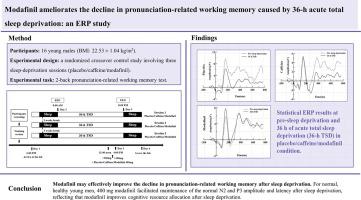Neurobiology of Learning and Memory ( IF 2.2 ) Pub Date : 2022-04-30 , DOI: 10.1016/j.nlm.2022.107625 Lin Xu 1 , Xue Yang 2 , Ziyi Peng 1 , Tao Song 1 , Letong Wang 1 , Cimin Dai 1 , Mengmeng Xu 1 , Yongcong Shao 1 , Jing Lv 2

|
We aimed to explore whether modafinil mitigates the working memory decline induced by 36 h of acute total sleep deprivation (36-h TSD). Sixteen healthy male participants were enrolled in a randomized double-blind crossover control study involving three sleep-deprivation sessions. Participants were administered 400 mg of placebo, caffeine, or modafinil during these sessions. Behavior and EEG data were recorded while participants performed pronunciation-related working memory tasks. Behavioral indicators showed that, compared with placebo, modafinil improved the accuracy of pronunciation-related working memory tasks and reduced the response time. Compared with before sleep deprivation, the amplitudes of the event-related potentials (ERPs) increased in the N2 component and decreased in the P3 component after sleep deprivation in the placebo condition. In the caffeine condition, the amplitude of the P3 component decreased, the latency of the N2 component was prolonged, and the N2 amplitude remained unchanged. In the modafinil condition, the P3 latency was shortened, and no significant difference was found in the amplitude of the N2 or P3 ERPs; no significant difference was recorded in the N2 latency. Modafinil (400 mg) effectively ameliorated the decline in pronunciation-related working memory after 36-h TSD, suggesting that it may effectively counteract cognitive decline caused by acute sleep deprivation.
中文翻译:

莫达非改善由 36 小时急性完全睡眠剥夺引起的发音相关工作记忆的下降:一项 ERP 研究
我们旨在探讨莫达非尼是否能减轻由 36 小时急性完全睡眠剥夺(36 小时 TSD)引起的工作记忆衰退。16 名健康男性参与者参加了一项随机双盲交叉对照研究,该研究涉及三个睡眠剥夺课程。在这些会议期间,参与者被给予 400 毫克安慰剂、咖啡因或莫达非尼。在参与者执行与发音相关的工作记忆任务时记录行为和脑电图数据。行为指标显示,与安慰剂相比,莫达非尼提高了发音相关工作记忆任务的准确性并缩短了反应时间。与睡眠剥夺前相比,安慰剂条件下睡眠剥夺后,事件相关电位(ERPs)的幅度在 N2 成分中增加,在 P3 成分中降低。在咖啡因条件下,P3成分的幅度降低,N2成分的潜伏期延长,N2的幅度保持不变。莫达非尼组P3潜伏期缩短,N2或P3 ERPs波幅无明显差异;N2潜伏期没有显着差异。莫达非尼 (400 毫克) 有效改善了 36 小时 TSD 后发音相关工作记忆的下降,这表明它可以有效抵消急性睡眠剥夺引起的认知下降。N2或P3 ERPs波幅无显着差异;N2潜伏期没有显着差异。莫达非尼 (400 毫克) 有效改善了 36 小时 TSD 后发音相关工作记忆的下降,这表明它可以有效抵消急性睡眠剥夺引起的认知下降。N2或P3 ERPs波幅无显着差异;N2潜伏期没有显着差异。莫达非尼 (400 毫克) 有效改善了 36 小时 TSD 后发音相关工作记忆的下降,这表明它可以有效抵消急性睡眠剥夺引起的认知下降。













































 京公网安备 11010802027423号
京公网安备 11010802027423号